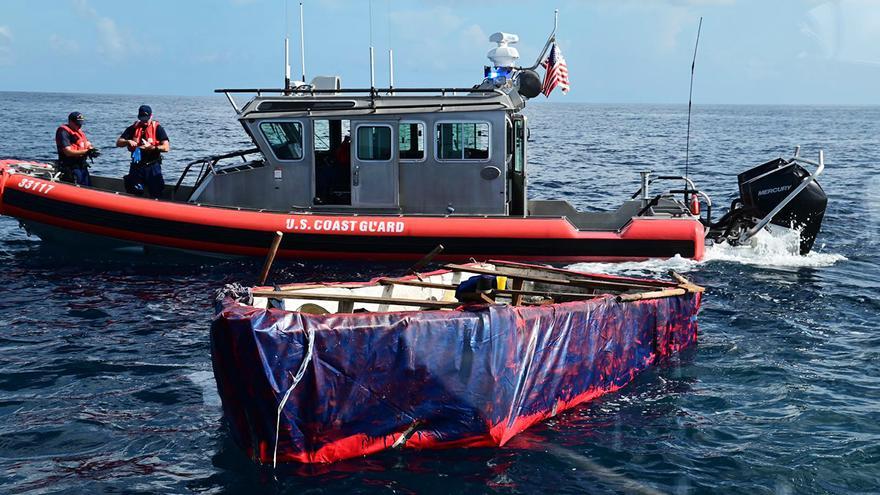
![]() 14ymedio, Havana, 21 September 2022 — On Tuesday, the U.S. Coast Guard, at the request of the Bahamas authorities, rescued 31 people who were adrift on the high seas. Among them were 28 Cubans, three Chinese, one Jamaican and one Dominican. The migrants were picked up by the ship Robert Yered and handed over to the Royal Bahamas Defense Force (RBDF), according to the U.S. Coast Guard on its Twitter account.
14ymedio, Havana, 21 September 2022 — On Tuesday, the U.S. Coast Guard, at the request of the Bahamas authorities, rescued 31 people who were adrift on the high seas. Among them were 28 Cubans, three Chinese, one Jamaican and one Dominican. The migrants were picked up by the ship Robert Yered and handed over to the Royal Bahamas Defense Force (RBDF), according to the U.S. Coast Guard on its Twitter account.
The 28 Cubans ’rescued’ on Tuesday are in addition to the six who, on September 6, were arrested and handed over to the RBDF, after the boat in which they were transported to Florida was intercepted by the U.S. Coast Guard.
The trafficking of migrants by sea has increased in the last month. On Monday, it was reported that Didier Pérez Pérez, Lester Leyniel Soca Díaz and Yoandy Alonso face six charges for transferring Cuban rafters to Florida, kidnapping them in a house in Hialeah, and extorting their relatives, of Cuban origin and residents of Florida, for the sum of $15,000. If found guilty, they will be sentenced to 10 years in prison and will be forced to pay fines of $250,000.
The U.S. Coast Guard announced on Wednesday that from October 2021 to date, 6,032 rafters have been intercepted and arrested. In addition, 50 more Cubans were repatriated, on board the Pablo Valent, who were added to the 68 who returned last Tuesday on the Paul Clark.
The Cuban exodus has been considered a real “migration catastrophe” by the Cuban virologist based in Brazil, Amílcar Pérez-Riverol. The number of rafters intercepted in their attempt to reach the United States, the scientist says, “exceeds the total of the previous five years.” In 2017, they arrested 1,468; in 2018 there were 259; in 2019, 313; in 2020, 49; and in 2021, 838, according to official figures.
The data are even more alarming if we consider that during this fiscal year 180,000 Cubans have entered the United States by land. And no record takes into account those who have emigrated to Europe and Latin America, which according to Pérez-Riverol’s calculations are equivalent to “1.6% of the population and 2.5% of the entire workforce.”
The flight of Cubans by sea has not diminished despite Hurricane Fiona, which continues its trajectory through the Caribbean islands and the Atlantic Ocean. On Monday, the Florida Border Patrol rescued and “put into custody six rafters that were stranded” in Gaius Marquesas. The head of this police force, Walter Slosar, warned of the dangers of going to sea in a “homemade boat in hurricane season.”
For her part, a Coast Guard non-commissioned officer, Nicole Groll, said in a statement issued on Tuesday that “migration on rustic and improvised boats without safety equipment, such as a life jacket, is dangerous,” and stressed to the rafters that “risking their lives in this way causes their loved ones unnecessary anxiety for not knowing if they are saved or lost at sea.”
Translated by Regina Anavy
____________
COLLABORATE WITH OUR WORK: The 14ymedio team is committed to practicing serious journalism that reflects Cuba’s reality in all its depth. Thank you for joining us on this long journey. We invite you to continue supporting us by becoming a member of 14ymedio now. Together we can continue transforming journalism in Cuba.
